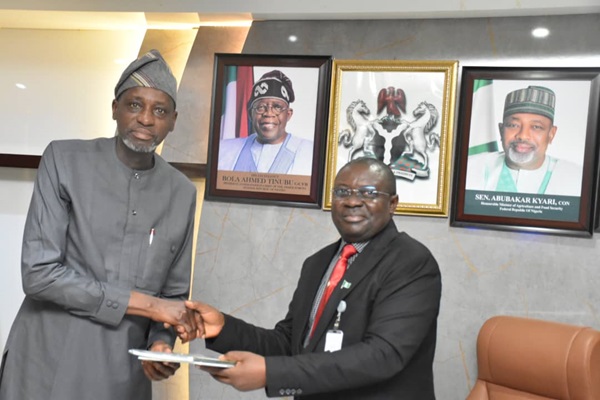
The Minister of Agriculture and Food Security, Sen. Abubakar Kyari has emphasised that agriculture and the blue economy are inextricably linked, particularly through aquaculture, inland fisheries, irrigated agriculture, wetland management and coastal livelihoods.
These connections, he noted, are crucial for building a more food-secure, environmentally resilient and economically inclusive Nigeria.
Speaking through the ministry’s permanent secretary, Dr. Marcus Ogunbiyi, the minister made the remarks while receiving participants of the Senior Executive Course (SEC) 47, 2025, from the National Institute for Policy and Strategic Studies (NIPSS), Kuru. The delegation, led by the institute’s director-general, Prof. Ayo Omotayo visited the ministry in Abuja on Wednesday, April 30, 2025.
Kyari stated that Nigeria’s vast inland waterways, wetlands and coastal zones offer significant opportunities for improving food security, enhancing nutrition and boosting economic empowerment, especially among rural populations. He added that aquaculture remains one of the fastest-growing sources of animal protein globally.
Referring to the 2025 course theme, “Blue Economy and Sustainable Development in Nigeria: Issues, Challenges and Opportunities,” the minister described it as both timely and relevant to the ministry’s mandate. He reiterated the importance of sustainable water resource management to support irrigated agriculture and enhance resilience to climate change. He further stressed that adopting sustainable practices in coastal agriculture can help mitigate environmental degradation, boost productivity and conserve biodiversity.
From a policy standpoint, the minister said integrating blue economy principles into Nigeria’s agricultural and rural development agenda is essential for achieving the Sustainable Development Goals (SDGs), particularly those related to ending hunger, reducing poverty and promoting inclusive economic growth.
He acknowledged existing challenges, including pollution, inadequate investment, and climate-induced stresses that continue to hinder the full realisation of the blue economy’s potential. Nevertheless, he assured that the ministry remains open to innovation, collaboration and evidence-based dialogue to move the sector forward.
In his remarks, NIPSS director-general, Omotayo commended the ministry’s programmes and called for a change in public perception of farmers. He noted that farmers endure great struggles to feed the nation and deserve recognition and respect.
He urged all Nigerians to participate in food production to better appreciate the value of farming.
A statement by the director of information at the ministry signed by Mrs. Anthonia Eremah noted that the highlight of the visit was the presentation of the National Agricultural Policy Document and a question-and-answer resource to the NIPSS participants.


